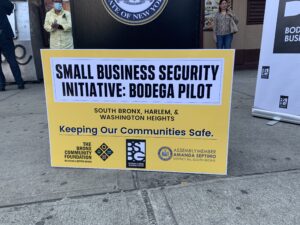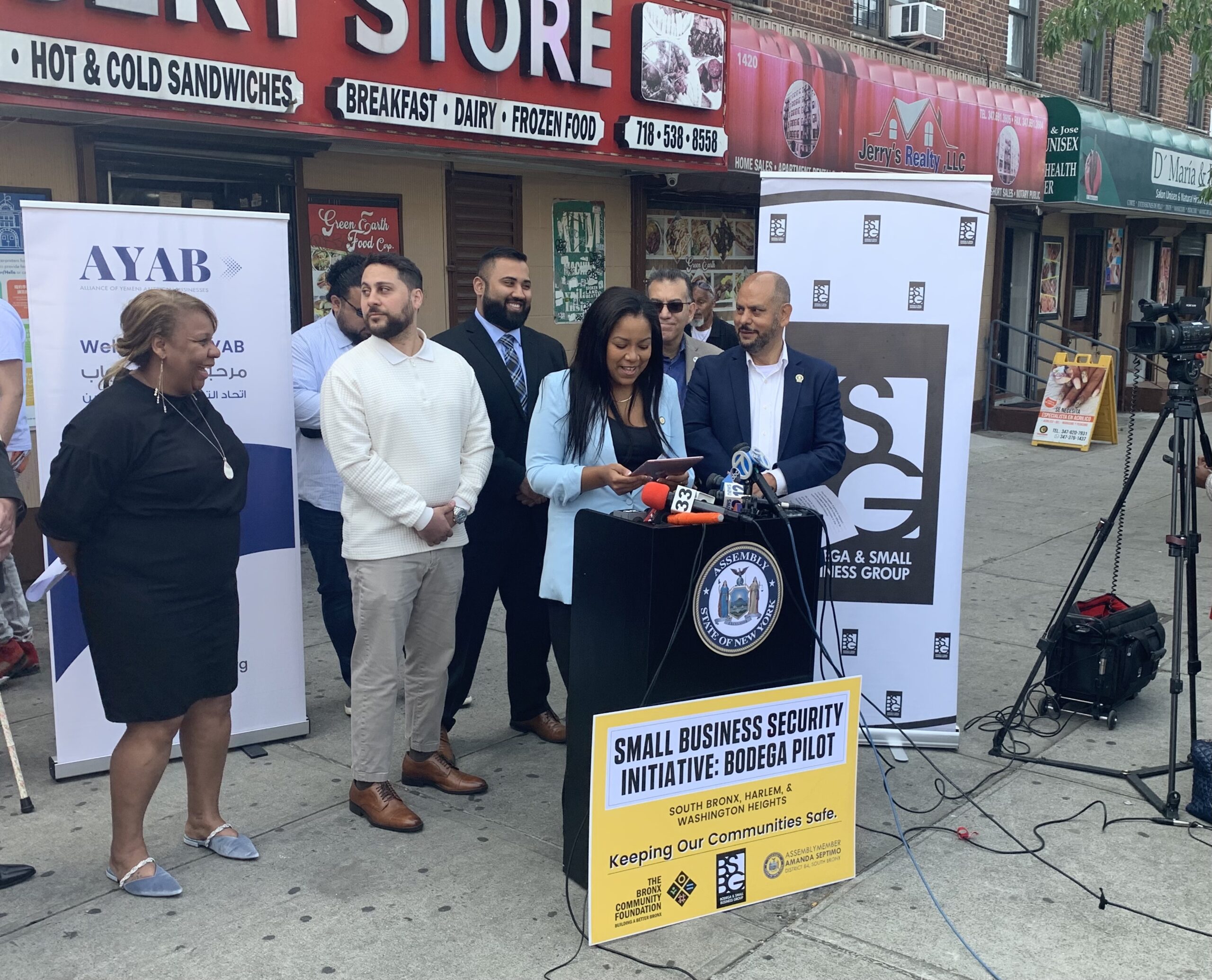South Bronx bodegas and other small businesses that have faced a spike in robberies over the past year are being offered a helping hand.
The Bronx Community Foundation, in coordination with Assemblywoman Amanda Septimo, has created a $1 million fund to pay for high resolution security cameras, panic buttons and updated point-of-sale systems for small businesses, to allow faster police response during a robbery.
The Small Business Security Initiative was announced at a news conference Monday by Septimo, Meisha Porter, the president of the Bronx Community Foundation, and a host of representatives from small business groups, including the Bronx Chamber of Commerce, the Bodegas and Small Business Group, and the Yemeni American Merchants Association.
The pilot program, which will launch June 1, is open to bodega, deli and other small business owners in the South Bronx, Harlem and Washington Heights – areas that have experienced the sharpest rise in burglaries and thefts in the past year.
“We are beginning with bodegas in these areas because of the recent uptick in violence,” said Septimo. Across the Bronx, robberies are up 39% and burglaries are up 45% over the last two years, while in South Bronx precincts, robberies are up an average of 68% and burglaries are up an average of 85% over the past two years.
Septimo’s office said she patterned the idea for a security fund around one offering similar assistance to houses of worship across the state, which have been recent targets of vandalism and theft. Asking for help, Porter offered the $1 million in pilot funds raised by the Bronx Community Foundation. The hope is to extend this to other boroughs in the future, as well as across the state, sponsors said.
Small businesses account for more than 4 million jobs in the city, roughly half of all employees of the private sector, and 98% of the city’s 200,000 businesses are small businesses, defined as having fewer than 100 employees, Septimo said.
Grant applications for the security devices will open June 1 and will be considered on a first-come, first-served basis. Applications will be available on Septimo’s and the Bronx Community Foundation’s websites. Grant amounts will differ on a case-by-case basis.

A bodega owner from the Hub, interviewed by The Mott Haven Herald, confirmed that the post-pandemic increase in crime has rattled owners, their employees and their customers.
“Delivery people, when they deliver stuff to the store they’re afraid to get cash because they think they’re going to chase them,” said Hisham Alomissi, owner of La Liga Deli Food on the corner of 149th Street and Courtlandt Avenue, who came to New York from Yemen in 2015.
Alomissi also owns Court Side Deli on 162nd Street and Morris Avenue, where he says drug addicts congregate and harass his customers. While Alomissi believes that upgraded security systems is a novel idea, he said more may be needed to solve the problem.
“Police cannot guarantee our safety if anything happens because they let them loose quick,” Alomissi said of today’s criminals. In a press conference held last June, Mayor Eric Adams himself said that the judicial system is taking too long to prosecute criminals, allowing them to continue to riddle the streets with crime in what he called a pattern of “catch, release, repeat.”
In July 2022, Jose Alba, a Manhattan bodega owner, faced second-degree murder charges when he fatally stabbed Austin Simon, who stepped behind the counter and began assaulting Alba. Alba was jailed but video evidence showed that Alba acted in self defense and charges were dropped. But it still sparked outrage amongst deli owners and employees across the city and left them angered and in fear.
The pilot program aims to mitigate the dangers these owners and their employees face. The higher resolution cameras will help police identify thieves, who often are repeat offenders already known to the police, one business leader said.
In neighborhoods where healthy food options can be scarce or supermarkets are far away, bodegas serve as a nearby oasis – one whose special role and value to the community became more evident during the pandemic, when most struggled to stay open to serve the community.
“That corner store is a therapist, it’s a daycare center, it’s a bank,” said Youssef Mubarez of the Yemeni American Merchant’s Association. “How many big businesses do that for their customers?”

